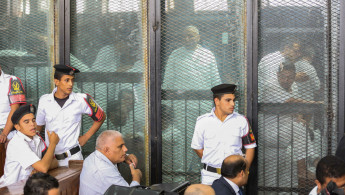Egypt court sentences 75 to death in 2013 Rabaa protest
Egypt sentenced 75 people to death, including top figures of the outlawed Muslim Brotherhood group, for their involvement in a 2013 sit-in, Egypt's state-run media said on Saturday.
The court’s decision in Cairo Criminal Court will now be referred to the Grand Mufti — the country's top theological authority — for his non-binding opinion on the sentences. He usually approves the court's decision.
Sentencing for more than 660 others was set for Sept. 8, according to state-run Al-Ahram news website.
The case involves 739 defendants, including the Muslim Brotherhood's Supreme Guide Mohammed Badie and photojournalist Mahmoud Abu Zeid, also known as Shawkan. Charges range from murder to damaging public property.
The 2013 sit-in supported former Islamist President Mohammed Morsi who was militarily ousted following mass protests against his divisive one-year rule. Morsi hailed from the Brotherhood.
Egyptian security forces killed over 1,000 people at the pro-democracy sit-in at Cairo's Rabaa Square.
Hundreds more were killed in street clashes with police over several months after the 14 August carnage.
Global rights groups Amnesty International and Human Rights Watch say at least 40,000 people were arrested within the first year of Morsi's removal.
On Thursday, Egypt's President Abdel-Fattah al-Sisi ratified a bill that could immunise senior military officers from future prosecution related to violence after the 2013 military coup.
The law, published in the official gazette, grants senior military officers selected by Sisi rewards including immunity from investigation for alleged offenses after the suspension of Egypt's former constitution in 3 July, 2013 until parliament assumed its duties on 10 January, 2016.
Any legal action against the selected officers requires permission from the Supreme Council of the Armed Forces under the new law. They are also privileged with "special immunities" like those granted to diplomats.
So far, hundreds have been sentenced to death or lengthy jail terms after speedy mass trials, including Morsi and several leaders of his outlawed Muslim Brotherhood.
Sisi succeeded Morsi and was elected president with 96.9 percent of the vote in June 2014. He won a second four-year term in March with 97 percent of the vote.





 Follow the Middle East's top stories in English at The New Arab on Google News
Follow the Middle East's top stories in English at The New Arab on Google News
![The UAE is widely suspected of arming the RSF militia [Getty]](/sites/default/files/styles/image_330x185/public/2024-11/GettyImages-472529908.jpg?h=69f2b9d0&itok=Yauw3YTG)
![Netanyahu furiously denounced the ICC [Getty]](/sites/default/files/styles/image_330x185/public/2024-11/GettyImages-2169352575.jpg?h=199d8c1f&itok=-vRiruf5)
![Both Hamas and the Palestinian Authority welcomed the ICC arrest warrants [Getty]](/sites/default/files/styles/image_330x185/public/2024-11/GettyImages-2178351173.jpg?h=199d8c1f&itok=TV858iVg)